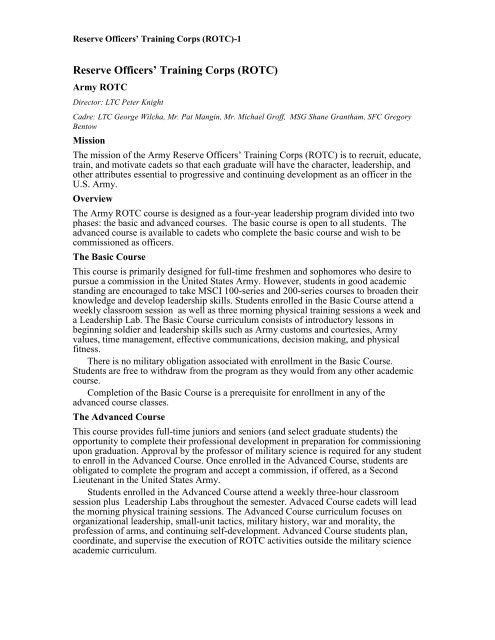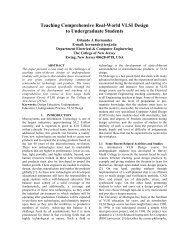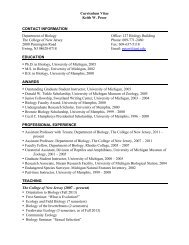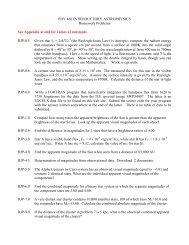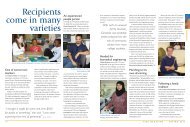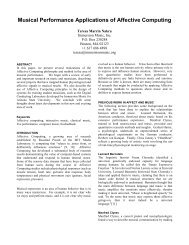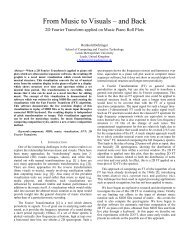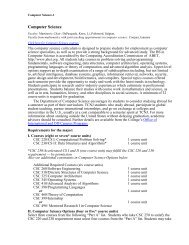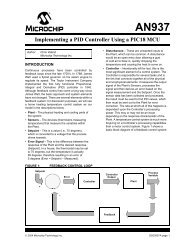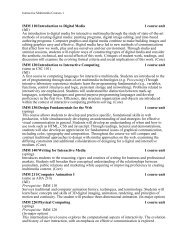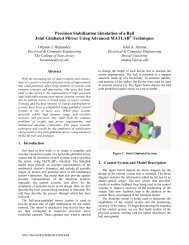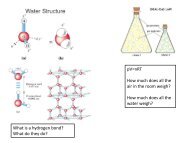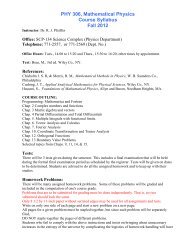Reserve Officers' Training Corps (ROTC)
Reserve Officers' Training Corps (ROTC)
Reserve Officers' Training Corps (ROTC)
You also want an ePaper? Increase the reach of your titles
YUMPU automatically turns print PDFs into web optimized ePapers that Google loves.
<strong>Reserve</strong> Officers’ <strong>Training</strong> <strong>Corps</strong> (<strong>ROTC</strong>)-1<br />
<strong>Reserve</strong> Officers’ <strong>Training</strong> <strong>Corps</strong> (<strong>ROTC</strong>)<br />
Army <strong>ROTC</strong><br />
Director: LTC Peter Knight<br />
Cadre: LTC George Wilcha, Mr. Pat Mangin, Mr. Michael Groff, MSG Shane Grantham, SFC Gregory<br />
Bentow<br />
Mission<br />
The mission of the Army <strong>Reserve</strong> Officers’ <strong>Training</strong> <strong>Corps</strong> (<strong>ROTC</strong>) is to recruit, educate,<br />
train, and motivate cadets so that each graduate will have the character, leadership, and<br />
other attributes essential to progressive and continuing development as an officer in the<br />
U.S. Army.<br />
Overview<br />
The Army <strong>ROTC</strong> course is designed as a four-year leadership program divided into two<br />
phases: the basic and advanced courses. The basic course is open to all students. The<br />
advanced course is available to cadets who complete the basic course and wish to be<br />
commissioned as officers.<br />
The Basic Course<br />
This course is primarily designed for full-time freshmen and sophomores who desire to<br />
pursue a commission in the United States Army. However, students in good academic<br />
standing are encouraged to take MSCI 100-series and 200-series courses to broaden their<br />
knowledge and develop leadership skills. Students enrolled in the Basic Course attend a<br />
weekly classroom session as well as three morning physical training sessions a week and<br />
a Leadership Lab. The Basic Course curriculum consists of introductory lessons in<br />
beginning soldier and leadership skills such as Army customs and courtesies, Army<br />
values, time management, effective communications, decision making, and physical<br />
fitness.<br />
There is no military obligation associated with enrollment in the Basic Course.<br />
Students are free to withdraw from the program as they would from any other academic<br />
course.<br />
Completion of the Basic Course is a prerequisite for enrollment in any of the<br />
advanced course classes.<br />
The Advanced Course<br />
This course provides full-time juniors and seniors (and select graduate students) the<br />
opportunity to complete their professional development in preparation for commissioning<br />
upon graduation. Approval by the professor of military science is required for any student<br />
to enroll in the Advanced Course. Once enrolled in the Advanced Course, students are<br />
obligated to complete the program and accept a commission, if offered, as a Second<br />
Lieutenant in the United States Army.<br />
Students enrolled in the Advanced Course attend a weekly three-hour classroom<br />
session plus Leadership Labs throughout the semester. Advaced Course cadets will lead<br />
the morning physical training sessions. The Advanced Course curriculum focuses on<br />
organizational leadership, small-unit tactics, military history, war and morality, the<br />
profession of arms, and continuing self-development. Advanced Course students plan,<br />
coordinate, and supervise the execution of <strong>ROTC</strong> activities outside the military science<br />
academic curriculum.
<strong>Reserve</strong> Officers’ <strong>Training</strong> <strong>Corps</strong> (<strong>ROTC</strong>)-2<br />
Advanced Placement<br />
Sophomores have opportunities to enter the <strong>ROTC</strong> program at the beginning and end of<br />
the academic year. Advanced placement does not result in the award of academic credits.<br />
1. Through the first semester Add/Drop deadline, sophomores who have not<br />
previously enrolled in <strong>ROTC</strong> may enroll in MSCI 201. A student who<br />
successfully completes MSCI 201 and MSCI 202 as well as additional<br />
requirements assigned by the instructor will meet the basic course prerequisites<br />
for entry into the advanced course.<br />
2. Sophomores who missed attending <strong>ROTC</strong> courses during their first three<br />
semesters at TCNJ may have the option to attend the Army <strong>ROTC</strong> Leader<br />
<strong>Training</strong> Course (LTC), a summer training opportunity at Fort Knox, KY,<br />
conducted during the summer before junior year. This opportunity is subject to<br />
available slating. This camp provides compressed instruction for all MSCI 100-<br />
and 200-series academic year courses. Student expenses are paid for by the Army.<br />
Students are also paid a nominal salary of about $800 for their attendance.<br />
Students must indicate an interest to attend LTC no later than March 31 of their<br />
sophomore year.<br />
3. Students with prior military service may receive placement credit for the basic<br />
course upon approval by the professor of military science. This credit is given on<br />
a case-by-case basis, taking into account the branch of service, length of service,<br />
type of discharge, and rank attained.<br />
For further details on any of these programs, call the Army <strong>ROTC</strong> office at (609)<br />
258-4225 or send an email to: armyrotc@princeton.edu.<br />
Financial Assistance<br />
Army <strong>ROTC</strong> Scholarships<br />
Each year the U.S. Army <strong>ROTC</strong> Cadet Command awards four-year, three-year, and twoyear<br />
scholarships to deserving men and women who desire to pursue a commission in the<br />
U.S. Army. Scholarships are competitive in nature and awarded to students based on<br />
merit. Currently, the <strong>ROTC</strong> scholarship pays full tuition and fees for TCNJ students.<br />
<strong>ROTC</strong> scholarship recipients also receive $600 each academic semester for textbooks and<br />
lab/clinical fees, along with a monthly spending allowance during the awarded period of<br />
the scholarship (Freshman $300, Sophomores $350, Juniors $450, Seniors $500)<br />
Advanced Course Students Additional Financial Assistance<br />
Juniors and seniors enrolled in the program are eligible to apply for guaranteed oncampus<br />
housing through <strong>ROTC</strong>. Additionally, enrolled students who are already<br />
members of the U.S. Army <strong>Reserve</strong> or Army National Guard, or those seeking to join,<br />
have the opportunity to earn additional income by joining the Simultaneous Membership<br />
Program (SMP) with either the Army <strong>Reserve</strong> or New Jersey Army National Guard. SMP<br />
cadets attend one drill weekend per month with their Army <strong>Reserve</strong> or National Guard<br />
units, but are not eligible for activation or operational deployments. Students who<br />
participate in the Advanced Course without benefit of a scholarship receive the monthly<br />
spending allowance. (Juniors $450, Seniors $500)<br />
Activities<br />
Army <strong>ROTC</strong> students participate in extracurricular activities as a student organization<br />
sponsored by the Department of Military Science. These activities are designed to build<br />
camaraderie, develop leadership skills, and produce competent military leaders. Activities<br />
include Leadership Labs (practical exercises on subjects learned in class). Once per<br />
semester, <strong>ROTC</strong> cadets attend a field-training exercise at Fort Dix or Fort Indiantown<br />
Gap to practice soldier skills in a military field environment. Other activities include
<strong>Reserve</strong> Officers’ <strong>Training</strong> <strong>Corps</strong> (<strong>ROTC</strong>)-3<br />
color guard ceremonies, the Ranger Challenge military skills competition (the varsity<br />
sport of Army <strong>ROTC</strong>), helicopter orientation flights, rappelling operations, paintball<br />
operations, tours of local battlefields (such as Princeton, Monmouth or Gettysburg), trips<br />
to military conferences, annual holiday ball and awards ceremonies, and leadership<br />
seminars. Each spring, cadets compete for the opportunity to attend military schools such<br />
as US Army Mountain Warfare, Northern Warfare, Airborne (military parachutest), Air<br />
Assault, Pathfinder, Special Forces Combat Diver and Sapper School during the summer<br />
(slots for these schools are very limited).<br />
Military Science Course Description<br />
MSCI 100-series courses are open to all students. For all other courses, enrollment<br />
requires the approval of the professor of military science. Students may accumulate up to<br />
3 course units from the Department of Military Science. All grades are counted in the<br />
student’s cumulative grade point average. Advanced placement does not result in the<br />
award of academic credits.<br />
MSCI 101/Introduction to Military Leadership I<br />
.25 course unit<br />
(annually—fall)<br />
Prerequisite: Freshman standing or permission of instructor<br />
An introduction to the <strong>ROTC</strong> program and the Army. Classes focus on Army leadership and<br />
management principles as well as basic soldier skills such as first aid and map reading, and<br />
familiarization with the U.S. Army’s customs, courtesies, standards, and rank structure. Students<br />
also receive an introduction to basic leadership principles expected of military officers.<br />
Students interested in MSCI 101 will be invited to participate in an Adventure Leadership<br />
Opportunity training week conducted the week prior to freshmen move-in day. Activities include<br />
paintball operations, a canoe team-building exercise on the Raritan, a helicopter orientation flight,<br />
a confidence obstacle course, and rappelling operations.<br />
MSCI 102/Introduction to Military Leadership II<br />
.25 course unit<br />
(annually—spring)<br />
Prerequisites: Freshman standing and completion of MSCI 101 or permission of the instructor<br />
This course builds on the lessons learned in MSCI 101 in basic soldier skills and leadership.<br />
Students learn how to use basic leadership and management techniques, improve their<br />
competence in basic soldier skills and tactics, and receive further professional development in<br />
leadership skills. Students are introduced to the career field opportunities available to Army<br />
officers.<br />
MSCI 201/Small-Unit Leadership I<br />
.25 course unit<br />
(annually—fall)<br />
Prerequisites: Sophomore standing and completion of MSCI 100-series courses, or permission of<br />
the professor of military science<br />
This course provides students with the opportunity to attain the next level of proficiency in<br />
physical fitness, basic soldier skills, problem solving, and leadership. This course introduces the<br />
operations order, a format for developing and communicating military operations, as well as<br />
further leadership development in effective communications, performance assessment, and<br />
counseling. Officer career field opportunities and responsibilities are also addressed in the course.<br />
MSCI 202/Small-Unit Leadership II<br />
.25 course unit<br />
(annually—spring)<br />
Prerequisites: Sophomore standing and completion of MSCI 201 or permission of the professor<br />
of military science<br />
Students participate in learning activities designed to provide practical experience in the use of<br />
the military decision-making processes. Oral presentation techniques and historical analysis of<br />
military decision making are also critical components of the course. Students prepare to assume<br />
cadet, non-commissioned officer leadership roles within the cadet command structure.
<strong>Reserve</strong> Officers’ <strong>Training</strong> <strong>Corps</strong> (<strong>ROTC</strong>)-4<br />
MSCI 301/Applied Military Leadership I<br />
.5 course unit<br />
(annually—fall)<br />
Prerequisites: Junior standing and completion of the basic course (MSCI 100 and 200 series, or<br />
advanced placement)<br />
Enrollment in this course marks a commitment to completing the <strong>ROTC</strong> program and receiving a<br />
commission as a second lieutenant in the United States Army. To this end, cadets study and<br />
practice the leadership aspects of planning and executing small-unit tactical operations. Further<br />
emphasis is given to development of leadership skills as measured by the Cadet Leadership<br />
Development Program, an evaluation system designed to improve an individual’s competence as<br />
a military leader. Cadets get hands-on practice on these skills through assigned leadership<br />
positions within the cadet command structure. Cadets continue to refine their individual physical<br />
fitness and assist seniors in leading unit fitness sessions.<br />
MSCI 302/Applied Military Leadership II<br />
.5 course unit<br />
(annually—spring)<br />
Prerequisites: Junior standing and completion of MSCI 301<br />
This course provides the cadets their final preparation for the National Advanced Leadership<br />
Camp normally attended in the summer between junior and senior years. Cadets refine their<br />
individual and military leadership, with practical exercise opportunities and feedback from senior<br />
cadets and instructors. The course emphasizes leadership in small units, use of the military<br />
operations order, land navigation, and physical fitness.<br />
MSCI 401/Leadership Development and the Profession of Arms<br />
.5 course unit<br />
(annually—fall)<br />
Prerequisites: Senior standing and completion of MSCI 300-series courses<br />
Cadets assume leadership roles within the cadet command structure. Cadets study the nature of<br />
military professionalism with respect to their future duties as officers. Students learn how to<br />
assess performance and to plan and supervise training using the Army’s training management<br />
system. The course strives to develop habits of independent study with historical readings and<br />
oral presentations. Cadets gain practical leadership experience as they lead the Army <strong>ROTC</strong><br />
program.<br />
MSCI 402/Leadership Development and the Profession of Arms<br />
.5 course unit<br />
(annually—spring)<br />
Prerequisites: Senior standing and completion of MSCI 401<br />
This course provides the final preparation for an officer’s commissioning. Learning activities<br />
include the Army Command Policy, Administrative Law, the Uniform Code of Military Justice,<br />
officer and enlisted evaluation and promotion systems, senior-subordinate relationships,<br />
performance counseling, and a tour of the Gettysburg Battlefield. Cadets gain practical leadership<br />
experience as they lead the Army <strong>ROTC</strong> program.<br />
Summer Offerings<br />
MSCI 222/Leadership <strong>Training</strong> Course<br />
(Introduction to Military Skills and Leadership)<br />
0 course unit<br />
Sophomores (and select students headed to graduate school) who missed attending courses during<br />
freshman and/or sophomore year have the option to attend Army <strong>ROTC</strong> Leadership <strong>Training</strong><br />
Course, a summer training opportunity at Fort Knox, KY, conducted during the summer before<br />
junior year. This camp provides compressed instruction for all MSCI 100- and 200-series academic<br />
year courses. All student expenses are paid for by the Army, plus students are paid a<br />
nominal salary of about $800 for their attendance, meals and housing are provided at no expense.<br />
This opportunity requires the student’s advanced commitment to pursue a commission as an<br />
Army officer.
<strong>Reserve</strong> Officers’ <strong>Training</strong> <strong>Corps</strong> (<strong>ROTC</strong>)-5<br />
MSCI 333/Leadership Development and Assessment Course<br />
(Advanced Military Leadership Practicum)<br />
0 course unit<br />
All cadets attend the Leadership Development and Assessment Course. Cadets who successfully<br />
complete their junior academic year and the MSCI 300-series courses attend this five-week<br />
leadership development camp at Fort Lewis, WA, where they are evaluated by commissioned<br />
Army officers on individual military skills and demonstrated leadership potential.<br />
MSCI 334/Cadet Troop Leader <strong>Training</strong><br />
(Junior Officer Leadership Internship)<br />
0 course unit<br />
Cadets who successfully complete MSCI 300-series courses in their junior year and the National<br />
Advanced Leadership Camp may request this opportunity. Cadets serve in tactical, active-duty<br />
Army units for three or four weeks, at military posts either overseas (Germany, Korea, Hawaii, or<br />
Alaska) or in any one of numerous locations throughout the continental United States. During this<br />
time, cadets get hands-on, practical experience in the platoon leader responsibilities they will<br />
assume as a second lieutenant. Cadets often use this opportunity to “try out” the branch of the<br />
Army they are most interested in pursuing during their career.<br />
MSCI 335/Army Nurse Summer <strong>Training</strong> Program (Clinical)<br />
0 course unit<br />
Nursing students who successfully complete MSCI 300-series courses in their junior year and the<br />
National Advanced Leadership Camp may request this opportunity to serve for three or four<br />
weeks in an Army hospital either overseas (Germany, Korea, and Hawaii) or in any one of the<br />
major military hospitals in the continental United States. Cadets get clinical experience working<br />
with commissioned officer Army nurses in an actual hospital environment.<br />
Air Force <strong>Reserve</strong> Officer <strong>Training</strong> <strong>Corps</strong> (AF<strong>ROTC</strong>)<br />
Department Chairperson: Lieutenant Colonel Matthew W. Lacy<br />
Professor: Lieutenant Colonel Matthew W. Lacy, B.S., United States Air Force Academy; M.A.,<br />
University of West Florida.<br />
Assistant Professors: Captain Brandon M. Ueki, B.S., Boston University, Captain Wade G.<br />
Smith, B.A. University of Colorado, M.A., Rutgers University<br />
TCNJ students may enroll in the Air Force <strong>ROTC</strong> program via a cross-town school agreement<br />
with Rutgers, The State University of New Jersey. AF<strong>ROTC</strong> is the largest and oldest source of<br />
commissioned officers for the Air Force. The program is designed to recruit, educate, and<br />
commission officer candidates through college campus programs based on Air Force<br />
requirements.<br />
Air Force <strong>Reserve</strong> Officer <strong>Training</strong> <strong>Corps</strong><br />
Air Force <strong>Reserve</strong> Officer <strong>Training</strong> <strong>Corps</strong> (AF<strong>ROTC</strong>) is a voluntary program of military<br />
education and leadership development open to qualified male and female students of all<br />
academic majors. Upon completion of the AF<strong>ROTC</strong> program and the attainment of a<br />
baccalaureate-level degree, cadets receive a commission as an officer in the U.S. Air<br />
Force. A monthly subsistence is provided during the junior and senior years.<br />
Scholarships<br />
Scholarships are awarded on a competitive basis in increments of four, three, and two<br />
years. Current information on scholarships is available on the web at afrotc.com and at<br />
the local Rutgers detachment website at afrotc.rutger.edu.<br />
Program Requirements<br />
Typically, AF<strong>ROTC</strong> is a four-year program; however, in many circumstances students may join<br />
during any term as long as they have at least three years of school left in either an undergraduate<br />
or graduate level course of study (or a combination of both).
<strong>Reserve</strong> Officers’ <strong>Training</strong> <strong>Corps</strong> (<strong>ROTC</strong>)-6<br />
Four-Year Program. The first two years of the four-year candidate program are called the<br />
General Military Course (GMC) and are voluntary. The GMC is designed to acquaint the new<br />
college student with the Air Force. Enrollment in the GMC does not place the student under any<br />
military service obligation. Requirements for the GMC include 03:690:121,122 and 221,222<br />
scheduled for one hour per week over the first four terms. In addition, Leadership Laboratory<br />
(03:690:171,172 and 271,272) is scheduled each week. One academic credit is awarded for the<br />
classroom work in each term of the GMC. Four-year candidates must attend a four-week field<br />
training encampment prior to their junior year. During his or her sophomore year, the student may<br />
apply for entrance into the Professional Officer Course (POC). The POC is contractual and is<br />
scheduled during the junior and senior years. Obligations include enlisting in the Air Force<br />
<strong>Reserve</strong>, completion of degree requirements, and acceptance of a commission in the U.S. Air<br />
Force if tendered. Term requirements for the POC include 03:690:232, 324 and 423,424<br />
scheduled for 3 hours per week. In addition, Leadership Laboratory (03:690:371,372 and<br />
471,472) is scheduled each week. Three academic credits are awarded for the classroom work in<br />
each term of the POC. Students who successfully complete the POC are commissioned as second<br />
lieutenants in the Air Force upon graduation and have an initial active duty obligation of four<br />
years. This active duty period is longer for pilots and navigators.<br />
Three-Year Program. The three-year candidate program offers college students, who have at least<br />
two full academic years remaining, an opportunity to catch up with their contemporaries and<br />
complete the AF<strong>ROTC</strong> program. Students accomplish this by taking an acclerated schedule of<br />
courses their first year in the program, afterwhich they attend Field <strong>Training</strong> in the summer<br />
between their first and second years.<br />
Membership Qualifications<br />
To qualify for membership in the Air Force <strong>ROTC</strong> program (as a cadet) a student must be a<br />
citizen of the United States, at least 14 years of age, physically qualified, and enrolled as a fulltime<br />
student. Students are eligible to take AF<strong>ROTC</strong> academic classes, even if they are not<br />
members of AF<strong>ROTC</strong>. To apply for membership in the program, students should contact the<br />
Unit Admissions Officer at (732) 932-7706 (ext. 19), or via email at rotc485@rci.rutgers.edu.<br />
Noncadet Enrollment<br />
Students who desire a varied aerospace education without seeking a commission are encouraged<br />
to enroll in classes on a space-available basis for the purpose of academic credit only. These<br />
students are not required to attend traditional <strong>ROTC</strong> activities, including the leadership<br />
laboratory. For more information, call 732/932-7706, or send an email to<br />
mailto:rotc485@rci.rutgers.edu.<br />
Uniforms and Allowances<br />
Uniforms and textbooks are supplied to all students enrolled in AF<strong>ROTC</strong>. Students enrolled in<br />
the POC and scholarship students receive a monthly graduated stipend ranging from $300 to<br />
$500, depending on their year in school.<br />
Courses<br />
03:690:121,122. The Foundations Of The United States Air Force (1,1)<br />
Survey course designed to introduce students to the United States Air Force and encourage<br />
participation in Air Force <strong>Reserve</strong> Officer <strong>Training</strong> <strong>Corps</strong>. Featured topics include: overview of<br />
<strong>ROTC</strong>, special programs offered through <strong>ROTC</strong>, mission and organization of the Air Force, brief<br />
history of the Air Force, introduction to leadership and leadership related issues, Air Force Core<br />
Values, Air Force officer opportunities, and an introduction to communication skills. Leadership<br />
Laboratory is mandatory for AF<strong>ROTC</strong> cadets and complements this course by providing cadets<br />
with followership experiences.
<strong>Reserve</strong> Officers’ <strong>Training</strong> <strong>Corps</strong> (<strong>ROTC</strong>)-7<br />
03:690:171,172. Leadership Laboratory I (0,0)<br />
Corequisites: 03:690:121,122. Enrollment limited to Air Force <strong>ROTC</strong> cadets. Fundamentals of<br />
drill and ceremonies; physical fitness training; leadership exercises.<br />
03:690:221,222. The Evolution Of Air And Space Power (1,1)<br />
Designed to examine general aspects of air and space power through an historical perspective.<br />
Utilizing this perspective, the course covers a time period from the first balloons and dirigibles to<br />
the space-age global positioning systems of the Afghan/Iraqi Wars. Historical examples are<br />
provided to extrapolate the development of Air Force capabilities (competencies), and missions<br />
(functions) to demonstrate the evolution of what has become today’s USAF air and space power.<br />
Furthermore, the course examines several fundamental truths associated with war in the third<br />
dimension: e.g. Principles of War and Tenets of Air and Space Power. As a whole, this course<br />
provides the students with a knowledge level understanding for the general element and<br />
employment of air and space power, from an institutional doctrinal and historical perspective. In<br />
addition, the students will continue to discuss the importance of the Air Force Core Values with<br />
the use of operational examples and historical Air Force leaders and will continue to develop their<br />
communication skills. Leadership Laboratory is mandatory for AF<strong>ROTC</strong> cadets and<br />
complements this course by providing cadets with followership experiences.<br />
03:690:271,272. Leadership Laboratory II (0,0)<br />
Corequisites: 03:690:221,222. Enrollment limited to Air Force <strong>ROTC</strong> cadets. Continuation of<br />
Leadership Laboratory I. Advanced drill and ceremonies; physical fitness training and evaluation;<br />
leadership exercises.<br />
03:690:323,324. Air Force Leadership Studies (3,3)<br />
Study of leadership, management fundamentals, professional knowledge, Air Force personnel and<br />
evaluation systems, leadership ethics, and communication skills required of an Air Force junior<br />
officer. Case studies are used to examine Air Force leadership and management situations as a<br />
means of demonstrating and exercising practical application of the concepts being studied. A<br />
mandatory Leadership Laboratory complements this course by providing advanced leadership<br />
experiences in officer-type activities, giving students the opportunity to apply leadership and<br />
management principles of this course.<br />
03:690:371,372. Leadership Laboratory III (0,0)<br />
Corequisites: 03:690:323,324. Enrollment limited to Air Force <strong>ROTC</strong> cadets. Advanced<br />
leadership experience in planning, organizing, directing, coordinating, and controlling.<br />
03:690:423,424. National Security Affairs (3,3)<br />
Examines the national security process, regional studies, advanced leadership ethics, and Air<br />
Force doctrine. Special topics of interest focus on the military as a profession, officership,<br />
military justice, civilian control of the military, preparation for active duty, and current issues<br />
affecting military professionalism. Within this structure, continued emphasis is given to refining<br />
communication skills. A mandatory Leadership Laboratory complements this course by<br />
providing advanced leadership experiences, giving students the opportunity to apply the<br />
leadership and management principles of this course.<br />
03:690:471,472. Leadership Laboratory IV (0,0)<br />
Corequisites: 03:690:423,424. Enrollment limited to Air Force <strong>ROTC</strong> cadets.<br />
Advanced leadership and management skills and their application.


